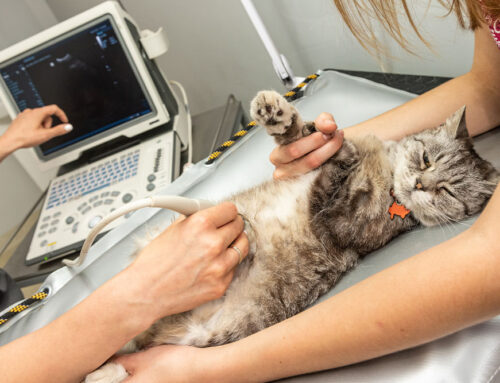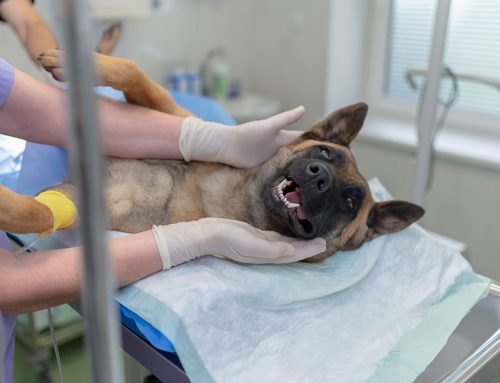An estimated 55.8% of dogs and 59.5% of cats are overweight, but 80% of pet owners think their pet is normal weight. Pet obesity has been normalized in the United States, and many pet owners are unaware that their pet’s weight is unhealthy, although extra pounds can cause significant health issues for pets. Pets at healthy weights also typically live about 2.5 years longer than overweight pets. Our Burlington Veterinary Center team wants to help by providing information about the risks of pet obesity and ways to properly manage your pet’s weight.
Conditions related to pet obesity
Obesity is linked to numerous significant health complications that negatively impact your pet’s quality of life and longevity, including:
- Arthritis — Excess weight puts added stress on joints, leading to arthritis. In addition, accumulated adipose tissue produces low grade chronic inflammation, which exacerbates joint damage caused by arthritis.
- High blood pressure — An obese pet’s heart must work harder to pump blood to the extra tissue, resulting in hypertension that can lead to issues such as retinal detachment, heart failure, stroke, and kidney disease.
- Chronic kidney disease — Excess weight forces the pet’s kidneys to work harder to filter waste, leading to kidney disease.
- Urinary tract disease — Increased urine glucose can facilitate bacterial growth, leading to a urinary tract infection. Obesity is also linked to calcium oxalate bladder stones.
- Diabetes — Studies suggest that accumulated body fat causes fat cells to release pro-inflammatory chemicals that can disrupt the function of insulin-responsive cells and their ability to respond to insulin, making the pet’s body less sensitive to insulin.
- Cranial cruciate ligament disease — Excess weight causes added strain to the pet’s cranial cruciate ligament (CCL), an important supporting structure in the knee. Obese dogs are four times more likely to rupture their CCL than normal weight dogs.
- Liver disease — Obesity predisposes pets to liver disease.
- Cancer — Research demonstrates that overweight cats and dogs are at greater risk for certain cancers. The National Cancer Institute estimates that pet obesity may account for 30% of cancer diagnoses in pets. These cancers are typically related to increased estrogen levels and insulin growth factors and chronic inflammation caused by accumulated fat cells.
- Heart failure — Specifically, abdominal obesity in pets is associated with an increased heart failure risk.
- Intervertebral disc disease — Excess weight places additional strain on the discs that separate your pet’s vertebral column and can lead to intervertebral disc disease. This condition causes significant pain and can result in severe, permanent mobility issues for your pet.
- Respiratory issues — Overweight pets are at increased risk for laryngeal paralysis and a collapsing trachea.
- Heat stroke — Overweight pets have extra insulation that prevents them from regulating their temperature normally, putting them at higher heat stroke risk.
- Anesthesia complications — Anesthesia calculations are based on lean body weight, and determining an appropriate dose for an overweight pet can be difficult.
Owners who have overweight pets spend about 17% more on healthcare and 25% more on pet medications. Keeping your pet at a healthy weight is good for your pet—and your wallet.
Managing your pet’s weight
Keeping your pet at a healthy weight is the best way to prevent obesity-associated issues. Tips to manage your pet’s weight appropriately include:
- Scheduling regular wellness visits — Our veterinary team will perform a weight assessment at your pet’s wellness visit to determine their weight status and track their progress.
- Weighing your pet — Purchase a pet scale and weigh your pet periodically to track their weight.
- Assessing your pet’s body condition score (BCS) — A BCS is a tool used to evaluate your pet’s body fat. The most common scale ranges from one to nine, with a BCS of one indicating the pet is extremely emaciated, and a BCS of nine indicating that the pet is extremely obese. An ideal BCS is four to five. Assigning a score involves visualizing and palpating your pet at certain body parts.
- Calculating your pet’s energy requirements — Use a calorie calculator to accurately determine how many calories your pet needs every day, and read their food bag label to calculate an exact meal portion.
- Measuring your pet’s food — Use a measuring cup or a kitchen scale to measure your pet’s food, to ensure you feed the correct amount. One or two extra kibbles can make a huge difference to a tiny Chihuahua.
- Exercising your pet — Ensure your pet receives regular exercise to help them maintain a healthy weight.
Helping your pet lose excess weight

If you determine that your pet is overweight, our veterinary professionals can help you devise a weight loss strategy to safely lose the excess pounds. We will customize your pet’s plan based on their specific needs, but general steps include:
- Choosing an appropriate food — Overweight pets should be fed a diet scientifically formulated to help them lose weight. Simply reducing their normal amount of food can lead to malnourishment.
- Monitoring your pet’s weight — Weighing your pet every two to three weeks is important, so you can track their progress and make adjustments if they aren’t losing weight.
- Increasing your pet’s activity level — Gradually increase your pet’s activity level, so they safely get more exercise.
- Maintaining your pet’s weight — Once your pet has reached an ideal weight, take steps to ensure they maintain the healthy weight.
Pet obesity is a serious problem, but you can take steps to ensure your pet maintains a healthy weight. If you are concerned about your pet’s weight, contact our Burlington Veterinary Center team, so we can assess their weight and develop a safe weight loss strategy, if necessary.







Leave A Comment